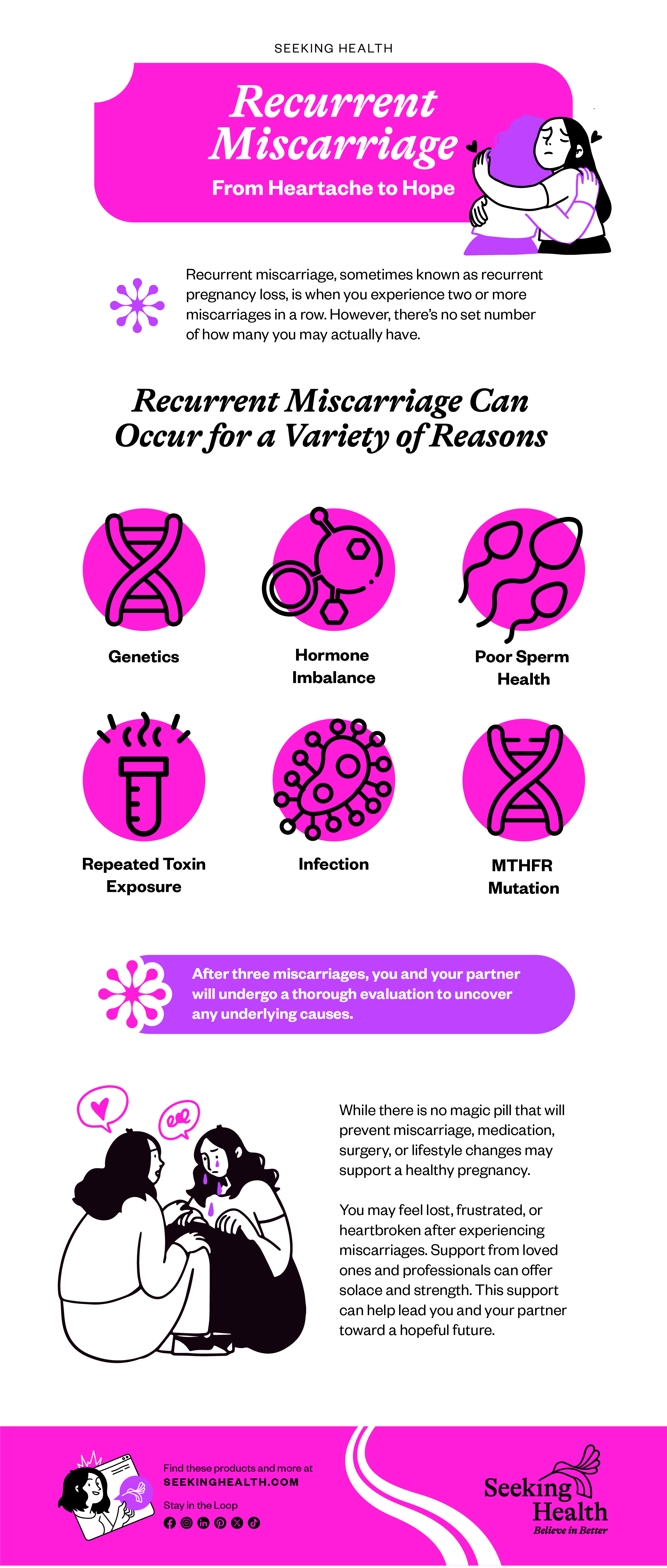If you've found your way here, you might be feeling lost, frustrated, or heartbroken after experiencing recurrent miscarriages. There's no question that it's a road that's emotionally and physically debilitating for you and your partner.

We're here to illuminate the path through the darkness of recurrent miscarriages. We want to provide understanding, comfort, and hope. Keep reading to discover possible explanations for recurrent miscarriages to explore with your healthcare practitioner. We also offer ideas for getting you and your partner through the tough times.
Whether you seek information or support, we're here for you. We want you to know that we’re here every step of the way. By unraveling some of the mystery, we hope to give you and your partner some perspective that helps you feel understood, supported, and hopeful.
What Is Recurrent Miscarriage?
Recurrent miscarriage—sometimes known as recurrent pregnancy loss—is when you experience two or more miscarriages in a row. A miscarriage is the loss of a pregnancy before 20 weeks of gestation. It's a more common experience than you may realize.
Miscarriage is the most common pregnancy complication, affecting up to 25% of known pregnancies.( 1) Recurrent miscarriage may affect up to 5% of couples.( 2) These numbers may actually be higher because you may not even know you're pregnant and miscarry, thinking it's your period or spotting.
When miscarriages happen repeatedly, it can point to underlying health issues that need your attention. And remember, understanding both your and your partner's health is crucial to understanding miscarriage. Causes can range from an unhealthy uterus or cervix to unhealthy sperm. It's a challenging situation that brings both physical and emotional pain. But understanding that it's a medical condition that many people like you face can provide some comfort.
What Causes Recurrent Miscarriage?
While it's common to focus on women when discussing miscarriages, it's essential to understand that both partners can play significant roles in reproductive health.
Recurrent miscarriage can occur for a variety of reasons:
- Genetic issues. Up to 60% of miscarriages may be due to chromosomal anomalies.( 3)
- Poor uterine, cervical, or placental health.
- Autoimmune diseases like lupus and antiphospholipid syndrome (APS).( 4,5)
- Hormone imbalances in either partner.
- Immune system issues where it mistakenly attacks the growing fetus.
- Environmental issues, like repeated exposure to pesticides, heavy metals, and dioxin derivatives.( 6)
- Smoking, excessive alcohol consumption, or illicit drug use on behalf of either partner.
- Age. Women between the ages of 35-40 have a 20% to 30% of having a miscarriage.( 7)
- Infections like sexually transmitted diseases (STDs) or rubella (German measles).
- Methylenetetrahydrofolate reductase (MTHFR) mutations. MTHFR is crucial for developing healthy DNA, RNA, and cells. If you have a mutation, you may have a 3.6-fold increased risk for recurrent miscarriage.( 8)
Talking openly and honestly with your partner and healthcare professional is essential. This can help you identify potential risks and develop strategies to support a healthy pregnancy.
Can Weak Sperm Cause Miscarriage?

Poor-quality sperm can contribute to miscarriage. Sperm with damaged DNA or specific genetic abnormalities can fertilize an egg. However, the resulting embryo might not develop properly. This can lead to a miscarriage. It's like trying to build a house with faulty materials—even if the foundation (the egg) is strong, using weak materials (sperm) can lead to problems that prevent the house (embryo) from being built correctly.
Sperm quality can be poor for several reasons:( 9)
- Hypothalamus or the pituitary gland problems.
- Testicular disease.
- Sperm transport disorders.
- Infection.
- Certain medications like calcium channel blockers, tricyclic antidepressants, anti-androgens, opioids, and anabolic steroids.
Poor sperm quality may also result from reduced testicular steroidogenesis (converting cholesterol to steroid hormones). Steroid hormones are critical for growth, development, energy metabolism, homeostasis, and reproduction. Other reasons for poor sperm quality include semen oxidative stress and DNA damage.( 10)
A healthcare practitioner can test sperm health. They'll look at its movement, shape, and other quality factors. You and your healthcare practitioner can then take action to support healthy sperm. This might include eating healthier, exercising, avoiding smoking, and supporting emotional well-being.
Identifying and addressing the issue will give you a better chance of having a successful pregnancy in the future. Remember, you both play a crucial role in the process. It's a team effort to create the healthiest start possible for a baby.
What Happens After Three Miscarriages?

After experiencing three miscarriages, you can expect to undergo a thorough evaluation to uncover any of the underlying causes you read about earlier. Your healthcare practitioner will conduct tests to look at the reasons behind recurrent pregnancy losses.
These may perform diagnostic testing to look for the following:( 11)
- Chromosomal issues, like MTHFR mutation.
- Uterine and cervical structure.
- Reproductive conditions like polycystic ovarian syndrome or fibroids.
- Abnormal hormone levels.
- Semen and sperm quality.
- STDs like gonorrhea or syphilis.
- Abnormal blood sugar levels.
- Lupus, APS, or thyroid disease.
They may also discuss your lifestyle habits to determine what changes you and your partner can make to support a healthy pregnancy.
Understanding the root causes is the first step in supporting the chances of a successful pregnancy later on. However, there's no doubt that this is a time filled with a mix of hope and anxiety as you seek answers and solutions that may help you achieve your dream of parenthood.
How Many Miscarriages Can You Have?
Unfortunately, the question of how many miscarriages you can have isn't straightforward—there's no set number. It all depends on you and your partner's unique situation. It's also important to keep perspective: what may happen to someone else may not happen to you. Only you and your healthcare practitioner know best!
Is There Any Treatment For Recurring Miscarriage?

While there is no magic pill that will prevent miscarriage, medication, surgery, or lifestyle changes may support a healthy pregnancy. The most important thing to remember is that there is hope. You may still go on to have a healthy pregnancy with the proper care and support.
Treatment options may include:
- Addressing hormonal imbalances.
- Performing uterine or cervical surgery to fix any abnormalities.
- Prescribing blood thinners to treat APS.
- Controlling conditions like high blood pressure or thyroid disease.
- Prescribing medication to eliminate infections, like STDs.
Progesterone treatment may also help support healthy, full-term pregnancy. This may be especially critical when the reason for recurrent miscarriages is unclear.( 12) Progesterone supports uterine health, creating an ideal environment for a healthy fertilized egg. If you lack progesterone in the first weeks of pregnancy, it may increase your chance of miscarriage. This is why your healthcare practitioner may prescribe progesterone in the first trimester of your pregnancy to help support your chances of carrying a healthy baby to full term.
Your healthcare practitioner will also have you incorporate folate into your diet. Folate is a superhero vitamin for pregnancy because it supports your and your baby’s health, particularly in early pregnancy. It helps support your baby’s nervous system growth and, in turn, your ability to carry your baby to full-term. While folic acid sounds similar and is often added to foods like cereal, folate is naturally found in foods like leafy greens, oranges, and beans. You may wonder why you should pick folate over folic acid. The answer is simple—your body can use folate directly because it’s bioavailable, making it faster and easier to absorb.†
Other healthy habits to support a healthy pregnancy—several of which you and your partner can both practice—include:( 13)
- Eating a healthy, balanced diet.
- Quitting smoking.
- Cutting back on caffeine.
- Eliminating alcohol.
- Engaging in healthy practices that support mood.
- Taking a prenatal vitamin.†
- Getting regular exercise.
- Avoiding exposure to illness and infection.
- Practicing safe sex.
Though facing recurrent miscarriages can be incredibly challenging, remember that every case is unique, including yours. That’s why you must attend all your healthcare visits so your practitioner can watch your health and well-being. With the proper care, you may still be able to go on to have a healthy pregnancy.
Can You Prevent Miscarriage?
Unfortunately, miscarriage is not 100% preventable. However, as you read earlier, your healthcare practitioner can help you create a plan that supports your and your partner’s reproductive health to support your chances of having a healthy pregnancy and a healthy baby. Additionally, they may prescribe bed rest and ask you to avoid sexual intercourse to support a healthy, full-term pregnancy if complications arise.
How Can You Cope?

Coping with a miscarriage is incredibly difficult for you and your partner. It's also important to understand that everyone processes this loss differently. You may find solace in talking about your feelings. However, your partner might prefer to reflect in silence. Communicating openly with each other about what you're going through is crucial. It would also help if you tried to listen with empathy and without judgment. Creating a space where both of you can express your emotions and support each other is vital. Remember, it's okay to feel a range of emotions, including sadness, anger, confusion, and guilt. These feelings are normal, and acknowledging them is a step towards healing.
In addition to leaning on each other, seeking support from friends, family, or a professional therapist can be beneficial. Sometimes, talking to others who have experienced a miscarriage can provide comfort and a sense of community. Engaging in self-care activities, such as taking walks, practicing mindfulness, or participating in a hobby, can also help ease the emotional burden. Giving yourselves time to grieve and understand that healing is a process is essential. Celebrating the memory of your baby by planting a tree or creating a memory box can offer a way to honor your loss and move toward healing. Remember, it's okay to seek joy and look forward to the future while also respecting your past experience.
Seeking Health’s Pregnancy Vitamins and Supplements
If you’re ready to start taking prenatal vitamins, you can check out Seeking Health’s pregnancy vitamins and supplements. We’ve developed these supplements to help support you and your partner throughout pregnancy. You can take these supplements from when you first try getting pregnant until after delivery. We’ve also included methyl-sensitive formulas if you experience side effects from taking traditional supplements.†
- Prenatal Essentials contain key pregnancy nutrients, including methylated forms of folate, B12, and trimethylglycine (TMG). They support healthy MTHFR, BC01, and GST/GPX genes crucial for healthy fertility, pregnancy, and cell division.†
- Prenatal Essentials MF supports healthy immune, spine, and brain development. Prenatal Essentials MF contains B12 and folate in bioavailable, methyl-free forms to support optimal methylation.†
- Optimal Prenatal MF is a high-strength, first-of-its-kind, non-methylated prenatal supplement containing a blend of amino acids, chelated minerals, and bioavailable B vitamins to support a healthy pregnancy.†
- Optimal Man™ is designed to support male health, fertility, and testosterone levels. This unique blend contains active folate and B12, Tongkat Ali, maca, ashwagandha, Eurycoma, and Panax ginseng in support of reproductive health.†
None of the supplements in our prenatal collection contain iron. This allows you to customize your iron intake according to your healthcare practitioner's advice, which may be more gentle on your body.
The Bottom Line

Facing a miscarriage is one of the toughest challenges you can go through. However, be encouraged, knowing there's a path to healing and hope. Discovering the reasons behind a miscarriage can offer much-needed answers. There are treatments and lifestyle habits that may help support your chances of having a child in the future. Coping with the loss is deeply personal and takes time. Seeking support from loved ones and professionals can offer solace and strength. Know that it's okay to grieve and take the time you and your partner need. Together, with support and understanding, moving forward step by step is possible, leading you toward a future filled with hope.

References:
- https://pubmed.ncbi.nlm.nih.gov/26000502/
- https://pubmed.ncbi.nlm.nih.gov/28553146/
- https://pubmed.ncbi.nlm.nih.gov/25659378/
- https://pubmed.ncbi.nlm.nih.gov/38322608/
- https://pubmed.ncbi.nlm.nih.gov/32265421/
- https://pubmed.ncbi.nlm.nih.gov/36819435/
- https://my.clevelandclinic.org/health/diseases/22438-advanced-maternal-age
- https://pubmed.ncbi.nlm.nih.gov/30158810/
- https://www.mayoclinic.org/healthy-lifestyle/getting-pregnant/in-depth/fertility/art-20047584
- https://pubmed.ncbi.nlm.nih.gov/30602480/
- https://www.nhs.uk/conditions/miscarriage/causes/
- https://pubmed.ncbi.nlm.nih.gov/31745982/
- https://my.clevelandclinic.org/health/diseases/9688-miscarriage
† These statements have not been evaluated by the Food and Drug Administration (FDA). This product is not intended to diagnose, treat, cure, or prevent any disease.












